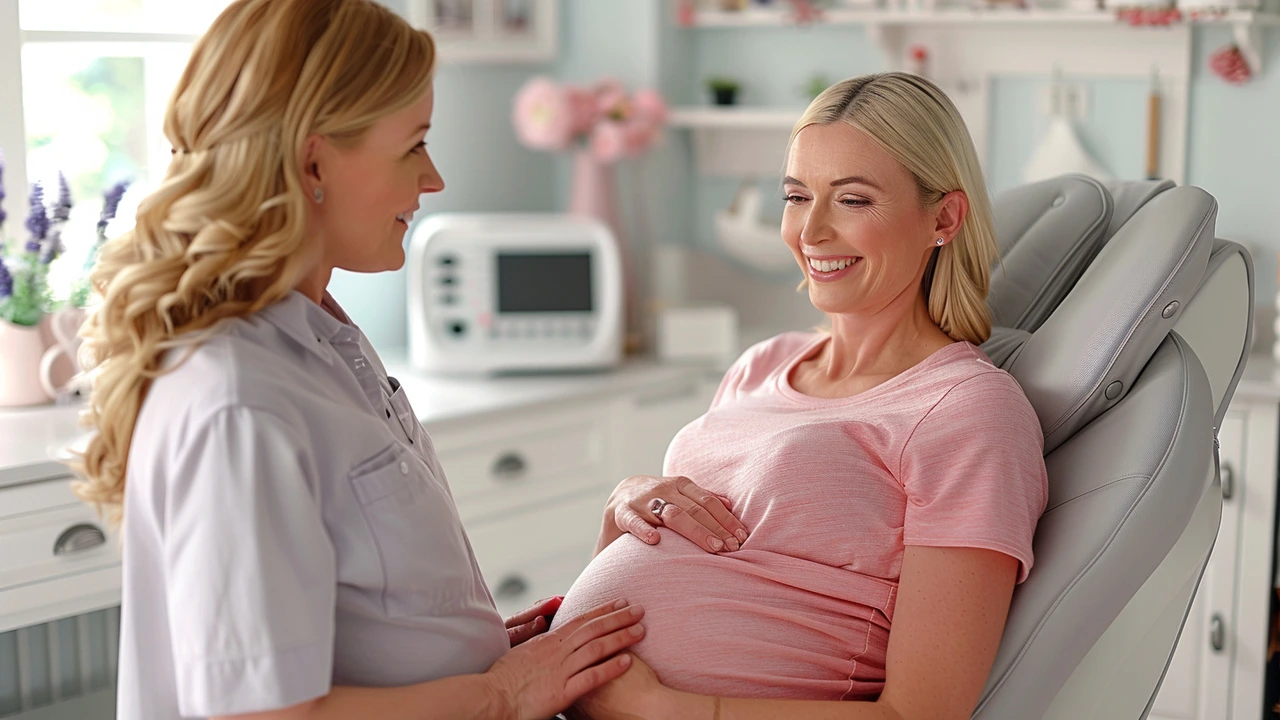Prenatal Massage Benefits: A Comprehensive Guide to Pregnancy Care

- Jun, 18 2024
- 0 Comments
- Donovan Smithson
Pregnancy is a beautiful journey filled with moments of joy and anticipation. But it also comes with its fair share of physical discomforts and emotional challenges. One effective way to ease these discomforts is through prenatal massage, a specialized form of bodywork designed to support expectant mothers.
Prenatal massage focuses on reducing stress, relieving pain, and preparing the body for labor. With proper techniques and safety measures, it can be a valuable addition to regular prenatal care.
In this guide, we’ll explore the benefits of prenatal massage, discuss different types, and provide essential tips for finding the right therapist. Dive in to discover how prenatal massage can make your pregnancy journey smoother and more comfortable.
- Introduction to Prenatal Massage
- Benefits of Prenatal Massage
- Types of Prenatal Massages
- Safety Tips and Precautions
- Choosing the Right Massage Therapist
- Personal Stories and Testimonials
Introduction to Prenatal Massage
Entering into the world of prenatal massage can be a soothing experience for many women as they navigate the ups and downs of pregnancy. Prenatal massage, also known as pregnancy massage, is a specialized form of massage therapy tailored to meet the needs of expectant mothers. It offers a safe way to alleviate discomfort and foster relaxation, which can be essential during this transitional phase.
The concept of prenatal massage dates back centuries. It has roots in various traditional practices around the globe, from ancient Chinese medicine to Ayurvedic therapies in India. These techniques have been passed down through generations, reflecting the timeless benefits they provide. Modern-day prenatal massages incorporate these ancient methods with contemporary understanding of pregnancy needs.
One of the primary goals of prenatal massage is to reduce stress. Stress relief is not just about feeling good; it's about promoting a healthy pregnancy. High levels of stress can increase the risk of complications like high blood pressure and premature labor. Regular prenatal massage can help keep stress in check, contributing to better overall health for both the mother and the baby.
Adjustment to physical changes is another significant aspect of prenatal massage. As the body changes to accommodate a growing baby, it can lead to discomfort and pain. Back pain, sciatica, swelling, and headaches are common complaints during pregnancy. A skilled prenatal massage therapist knows the right techniques to address these issues, such as gentle pressure and specialized positioning to ensure comfort and safety.
Pregnancy massage also prepares the body for labor. By working on specific muscle groups, it can help improve circulation, reduce muscle tension, and increase flexibility. These benefits can contribute to a smoother labor process. Some studies suggest that women who receive regular prenatal massages experience shorter labor times and less need for pain medications.
According to the American Pregnancy Association, prenatal massage provides both physical and emotional support to expectant mothers. They highlight that it can: reduce anxiety, decrease symptoms of depression, and improve sleep. The mental and emotional uplift received from a well-timed massage can be just as vital as the physical relief.
"Massage during pregnancy is not just a luxury; it is a way to take care of your body and baby," notes Dr. Josephine Chang, a well-recognized obstetrician-gynecologist specializing in prenatal care.
Massage therapists trained in prenatal care use special techniques to accommodate the developing body of an expectant mother. They might use bolsters, pillows, or specially designed massage tables to ensure proper support and alignment during the session.
If you're considering prenatal massage, it's important to consult with your healthcare provider first. They can guide you on the right time to start and any specific precautions. Always ensure you're working with a certified prenatal massage therapist who understands the unique needs and contraindications of pregnancy. This way, you can reap the many benefits of prenatal massage safely and effectively.
Benefits of Prenatal Massage
Pregnancy brings both joy and a bit of discomfort. As the baby grows, the body undergoes changes that can lead to backaches, swollen ankles, and even stress. This is where the magic of prenatal massage can make a big difference. One of the most significant benefits is the relief of back pain. Carrying extra weight can be tough on your spine; massage can help ease muscle tension and improve posture.
Another wonderful benefit is the reduction of swelling. Pregnant women often experience edema, especially in the legs and feet. Gentle massage techniques can help stimulate soft tissues and reduce fluid accumulation. This can bring much-needed relief, making walking more comfortable.
Insomnia can be another issue. The nerves and muscles are under more strain during pregnancy, making it hard to get a good night's sleep. Studies have shown that regular massages can improve sleep quality by reducing stress levels and relaxing tense muscles. This, in turn, provides better rest, leading to more energy during the day.
Hormonal Balance and Mood Swings
Pregnancy hormones can cause mood swings, anxiety, and even depression. Massage therapy can significantly impact your emotional well-being by increasing the levels of serotonin and dopamine, hormones that make you feel happy and relaxed.
According to a study published in the Journal of Psychosomatic Obstetrics & Gynecology, women who received regular prenatal massages reported lower levels of depression and anxiety. They also noticed fewer complications during labor and childbirth.
“Massage therapy during pregnancy can significantly reduce anxiety, decrease symptoms of depression, and improve overall prenatal outcomes,” says Dr. Tiffany Field, a leading researcher in maternal mental health.
Preparation for Labor
Massage isn't just for comfort—it can also be a great preparation for labor. Techniques like perineal massage can help increase flexibility and reduce the risk of tearing during childbirth. Regular sessions can make labor quicker and less painful by improving circulation and reducing muscle tension.
In summary, prenatal massage offers a multitude of benefits that make pregnancy more enjoyable and less stressful. From alleviating physical discomforts to boosting emotional well-being, it's a holistic approach to maternal care that should not be overlooked.

Types of Prenatal Massages
A journey through pregnancy can sometimes feel like an emotional rollercoaster, and the right type of prenatal massage can bring great relief to expectant mothers. Several styles of prenatal massage techniques cater to different needs and are designed to provide the best possible care during this special time.
Swedish Massage is among the safest and most common types of prenatal massage. This method focuses on relaxing muscles, increasing blood flow, and improving lymphatic circulation. Swedish massage typically involves long, gliding strokes in the direction of blood returning to the heart, making it an excellent choice for reducing swelling and enhancing relaxation.
Deep Tissue Massage is another type of prenatal massage, albeit with caution. It targets deeper layers of muscles and connective tissue to address chronic pain and tension. However, it should only be performed by a therapist experienced with prenatal techniques, as it requires a delicate touch to avoid any complications.
Next on the list is the Shiatsu Massage, a technique rooted in Japanese tradition. Shiatsu involves applying pressure to specific points on the body, also known as acupressure points, to promote energy flow and alleviate discomfort. This type is especially beneficial for relieving lower back pain and reducing labor pain.
For those looking to address specific tension areas, Reflexology might be an ideal choice. Reflexology focuses on applying pressure to specific points on the feet, hands, and ears that are believed to correspond to different organs and parts of the body. By stimulating these reflex points, reflexology aims to enhance overall well-being and alleviate various pregnancy symptoms, such as nausea and headaches.
Hot Stone Massage is another relaxing method, although with certain modifications for prenatal safety. Instead of placing hot stones directly on the belly, the therapist uses them to gently massage other parts of the body, ensuring a soothing and warming experience that eases muscle tension and promotes relaxation.
According to Dr. Sarah Winkler, a renowned obstetrician, “Incorporating prenatal massage into a mother’s care routine can significantly reduce stress hormones and increase the levels of serotonin and dopamine, which are beneficial for both the mother and the baby.”
Lastly, there's the Seated Massage, often provided on a special chair designed to support the body during the massage. This type is perfect for those who might find it uncomfortable to lie down during later stages of pregnancy. It allows the therapist to work on the back, shoulders, and neck, providing relief from common pregnancy aches and pains.
Each type of prenatal massage has unique benefits and techniques, but the key is to find what suits the individual needs of the expectant mother. Consulting with a knowledgeable and certified prenatal massage therapist ensures a safe and beneficial experience tailored to personal preferences and medical requirements. Remember, every pregnancy is different, and what works for one person might not be ideal for another.
Safety Tips and Precautions
When considering a prenatal massage, it’s essential to prioritize safety to ensure both the expectant mother and the baby are well-protected. First and foremost, always consult with your healthcare provider before beginning any massage therapy. They can give specific advice and identify any potential risks based on your unique situation. Communication with your therapist is crucial, too. Inform them about your pregnancy, its stage, and any concerns you might have, such as high blood pressure or a history of miscarriages.
If you are in your first trimester, it's usually recommended to avoid massage as this period is delicate. Wait until the second trimester when the risk of miscarriage decreases. During massages, therapists typically use special side-lying positions with supportive pillows to ensure comfort and prevent lying flat on your back, which can press on important blood vessels and reduce blood flow to your baby.
Avoid deep tissue massage techniques, especially around sensitive areas such as the abdomen. Light, gentle strokes are more suitable during pregnancy. It is also vital to stay hydrated before and after the massage to help flush out any toxins released during the bodywork. Keeping the room temperature comfortable and not too hot is another aspect to consider, as overheating can be harmful during pregnancy.
Look for therapists who are certified in prenatal massage and have experience working with pregnant clients. They should know the necessary modifications and be aware of areas to avoid. Some essential oils and aromatherapy products are contraindicated during pregnancy. For example, oil extracts from basil or rosemary can potentially trigger contractions, so ensure your therapist uses pregnancy-safe products.
It’s a good idea to pay attention to your body’s response both during and after the massage. If you experience any pain, swelling, or unusual symptoms, discontinue the massage and contact your healthcare provider immediately.
“Prenatal massage, when done safely, can be a beneficial addition to prenatal care,” says Dr. Jane Goodwin, a renowned obstetrician. “It’s all about ensuring the right practices are followed to safeguard maternal and fetal health.”
In summary, understanding and following these safety tips and precautions can help you reap the benefits of prenatal massage. Remember, communication and the right choice of therapist go a long way in providing a relaxing and safe experience during your pregnancy.

Choosing the Right Massage Therapist
Finding the right massage therapist during pregnancy is crucial. It's not just about comfort; it's about ensuring the safety and well-being of both mother and baby. A qualified therapist should have specialized knowledge and experience in prenatal massage. They must be able to adjust their techniques to suit the needs of expectant mothers, who often experience a range of aches, pains, and circulation issues.
Start by checking the therapist’s credentials. Ensure they are certified in prenatal massage therapy. Many states have databases of licensed massage therapists, and it can be helpful to check these for confirmation. Additionally, it’s wise to look for reviews or testimonials from other pregnant women. Personal experiences can offer insight into how effective and comfortable the massage sessions might be.
Communication is vital when choosing a massage therapist. Before booking an appointment, discuss any specific health issues or concerns you have. A skilled therapist will listen to your needs and modify their techniques accordingly. They should avoid deep-tissue work in certain areas and be cautious around pressure points that could potentially trigger contractions. “Open communication helps build trust and ensures a positive experience,” says Dr. Jane Frederick, a renowned pregnancy care specialist.
Consider the massage setting as well. Pregnant women often prefer side-lying positions during the massage to alleviate pressure on the abdomen. Some therapists use pregnancy pillows or special tables with cutouts for the belly. Visit the facility to check if they have these accommodations or ask for detailed information beforehand.
When choosing a therapist, it’s also important to inquire about their approach to hygiene and cleanliness. This is always crucial, but even more so during pregnancy, when the immune system is somewhat reduced. Make sure they follow proper sanitation protocols and use fresh linens for each client.
Another aspect to consider is the therapist’s availability and flexibility. Pregnancy can be unpredictable, and you might need to reschedule appointments at the last minute. A therapist who is accommodating and understands the unique demands of pregnancy will help reduce your stress.
If you're part of a pregnancy care group or online community, seek recommendations from other members. Many women find their therapists through word-of-mouth and online forums dedicated to pregnancy care. Elaine found her therapist through a local mothers' group, which made her sessions very reassuring and comfortable from the start.
Lastly, consider cost and insurance coverage. Some health insurance plans cover prenatal massage, recognizing its benefits for both mother and child. Check with your insurance provider to see if this applies to you. Knowing this could make your search for the right therapist easier, and potentially more cost-effective.
Personal Stories and Testimonials
Experiencing the wonders of prenatal massage is something many expectant mothers rave about. For a lot of them, it’s not just about alleviating physical discomfort but also about enhancing their emotional wellbeing. Let’s dive into some personal stories and testimonials that highlight the positive impacts of prenatal massage.
Take Jessica, a mother of two from Denver. During her second pregnancy, she struggled with severe back pain and anxiety. Her doctor suggested trying prenatal massage. After just a few sessions, Jessica noticed a substantial improvement in her pain levels. She also found that she was sleeping better and feeling more relaxed overall. Jessica says, “Prenatal massage was a game-changer for me. It made my pregnancy much more enjoyable and manageable.”
Similarly, Megan, a first-time mom from Seattle, found relief through prenatal massage. She was dealing with swelling in her legs and feet, a common issue in the third trimester. Her therapist used specific techniques aimed at reducing fluid retention. Within weeks, Megan felt a significant reduction in swelling and discomfort. She shared her story saying, “I couldn’t believe how quickly the massage helped with my swelling. It made such a difference in my daily life.”
According to a survey by the American Pregnancy Association, more than 75% of women who received prenatal massages reported significant reductions in back pain and muscle tension. It’s not just anecdotal evidence; there’s a wealth of research backing the benefits of prenatal massage.
“Prenatal massage can be incredibly effective in reducing anxiety, relieving muscle aches, and improving labor outcomes,” notes Dr. Mary O’Sullivan, a renowned obstetrician.
Another testimonial comes from Emily, who found that prenatal massage helped her bond with her baby. She describes how the calming sessions allowed her to focus inward, connect with her baby, and prepare mentally for childbirth. Emily explains, “I felt a deeper connection with my baby during the massage sessions. It was a peaceful time for me to communicate with the little one growing inside me.”
These personal stories underline the varied benefits of prenatal massage, from physical relief to emotional healing. They amplify the fact that such massages can play a pivotal role in enhancing the pregnancy experience. If you’re considering this therapy, ensure you choose a certified therapist who specializes in prenatal care to get the most out of your sessions.